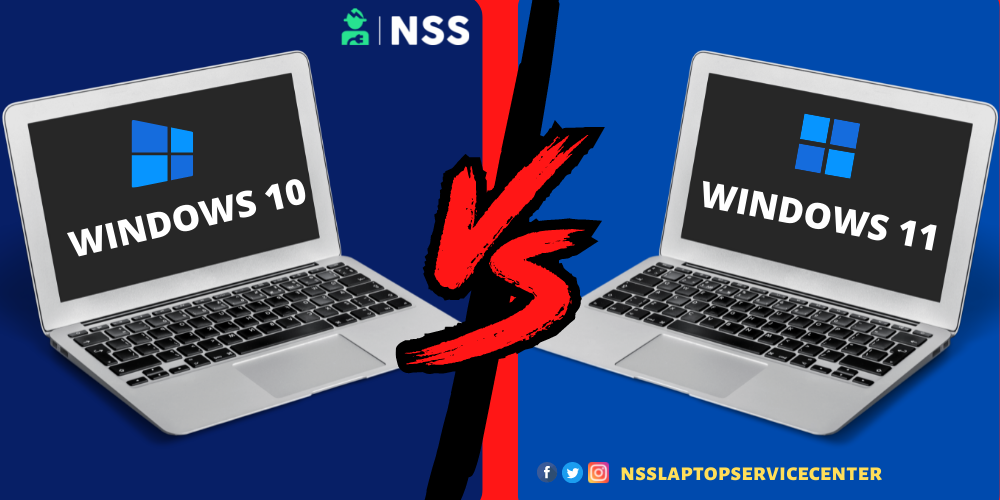
INTRODUCTION TO WINDOWS 10 vs WINDOWS 11
Windows 10 is a significant release of Microsoft's Windows NT operating system. It is the direct successor to Windows 8.1. It was released in the year 2015.
Windows 11 is the latest major release of Microsoft's Windows NT operating system in October 2021. It is a free upgrade to its predecessor, Windows 10 (2015).
Microsoft has launched quite several operating systems over the past few years. But still, their most important releases are Windows 10 and Windows 11. These operating systems have been made available to all users at no cost. The former was released on July 29, 2015, and the latter was released on October 2 (they both have separate names, but we'll call them Windows 10 and 11 for simplicity). Both devices have a lot of good features, which are going to be discussed below. In the current scenario, we all know that Windows 10 and Windows 11 are very popular among users. But still, if we compare them one by one, it would be challenging for both systems to get their share with each other. Let me start by discussing these two systems, which are Windows 10 and Windows 11:
Table of Contents
WINDOWS 10 vs WINDOWS 11: WHICH IS BETTER?
The most noticeable change in Windows 11 is a redesigned central taskbar that closely resembles the design of the macOS operating system. Compared to Windows 10, which occupies half of the desktop's length and has a prominent search bar added in the middle, this version seems much cleaner.
You can already view many windows at once in Windows 10, but it's a drag-and-drop process that may look rather shabby and leaves plenty of room for errors.
Snap Layouts, which are new in Windows 11, make having several windows open at once more straightforward.
Teams, a messaging service from Microsoft, was introduced in 2017, two years after Windows 10 was released. As a result, it was replaced by other apps like Slack as an optional one.
Teams will play a significantly more significant role in Windows 11.
THE UPGRADING BETWEEN WINDOWS 10 vs WINDOWS 11 IS IT WORTHWHILE?
The majority of people will find Windows 11 proper. Included are several new features, performance improvements, and design changes. The most recent Windows operating system usually attracts more attention than Windows 10. The danger of upgrading to Windows 11 is negligible as well. Users are increasingly upgrading their plans to get more power and functionality from their computers. This is especially true among users on personal computers because they want their systems to operate faster and look more attractive than previous editions.
Furthermore, people often need additional functionality beyond that provided by pre-installed programs or hardware designed into their existing machines. Sometimes, they may want these features added to software other than the operating system, such as antivirus and security software. There are also specific features that only work with popular web browsers or Internet services, essential compatibility with peripheral devices such as printers or handheld devices for mobile phones. These games function correctly on multiple platforms, such as those based on OpenGL or DirectX technologies or those using the Microsoft Silverlight 4 platform.
Also Read: 6 Best Ways To Repair Laptop Battery At Home
Also Read: How Can I Upgrade My Laptop Processor
WINDOWS 10 vs WINDOWS 11: THE ULTIMATE WINNER
We were concerned that any significant update would be upsetting since we've all been using Windows 10 for the past six years and have grown accustomed to how it works. Windows 11 is a better version of the same set of tools, and it has only recently become accessible. Although the layout can be changed to a more recognizable one, the design is comparable to Mac. Windows 11 has undoubtedly been speedier. I can switch between several open programs at once without any lag. Even that function has come in handy when running a few resource-intensive tasks.
Although the new setup takes a moment to get used to, Windows 11 has rapidly become standard. Windows 11 is the unmistakable champ because it is a superior rendition of something we've been utilizing for a long time. It's somewhat quicker, somewhat more grounded, and slightly more brilliant. That is the purpose of having these new forms emerge. These new variants are generally somewhat buggy from the beginning; however, the framework works better after a couple of update fixes than at any point. We're where Windows 11 is the following clear step. The highlights are somewhat better, and a few astonishing new calculations speed things up. Windows 11 is the victor.
Conclusion:
Microsoft's Windows is the most popular in the world. It overtook Mac OS (since its release) in 2010, and more than 5 billion people now use it. Millions of people use Windows for running apps like Microsoft Word, Excel, or Internet Explorer (still working). But when it comes to gaming use, older versions of Windows (i.e., older than XP) are only recommended for games that are too demanding for newer versions. Over the years, many users have asked which is better: Windows 10 or 11? In this article, we'll review all the major features and differences between these two latest versions of Microsoft's operating systems.
Frequently Asked Questions
Popular Services
- MacBook Battery Replacement Cost
- HP Printer Repair in Delhi NCR
- Dell Laptop Repair
- HP Laptop Repair
- Samsung Laptop Repair
- Lenovo Laptop Repair
- MacBook Repair
- Acer Laptop Repair
- Sony Vaio Laptop Repair
- Microsoft Surface Repair
- Asus Laptop Repair
- MSI Laptop Repair
- Fujitsu Laptop Repair
- Toshiba Laptop Repair
- HP Printer Repair Pune
- Microsoft Surface Battery Replacement
- Microsoft Surface Screen Replacement




